A thought hit me as I was taking communion last week:
Jesus told Jews to drink blood!
I have been learning in my course here at the Hebrew University of Jerusalem that Jews in Medieval Europe were falsely accused of drinking Christian blood, (Hebrew: dum, דם) in their rituals.
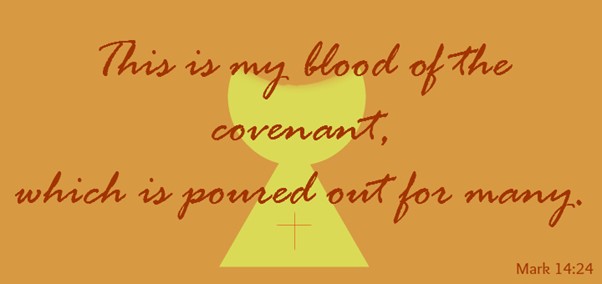
Blood libels claimed that Jews required human blood as an ingredient of Passover matzot (unleavened bread). Unexplained deaths of Christian children were put down to the Jews’ craving for blood.
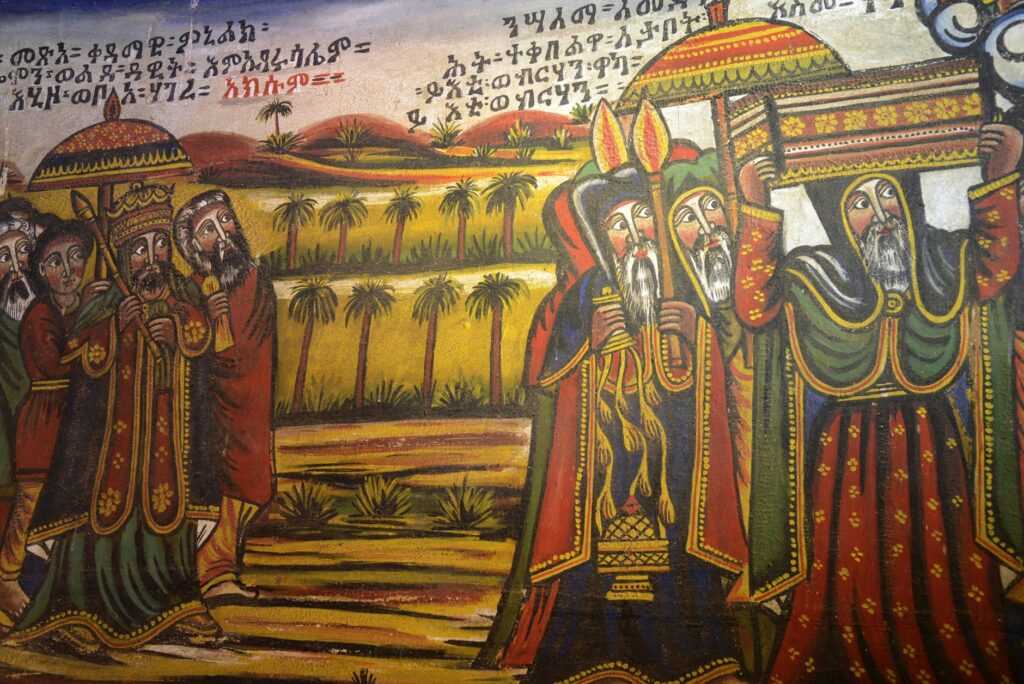
KOSHER
Knowing as I do that Orthodox Jews believe the soul, (nefesh, נפש), resides in the blood, I deemed this a dumb idea! Meat is made kosher by draining the blood: no Jew wants to take on the nefesh of an ox, hen or lamb!
COMMUNION
But, last week, as I was taking communion, I was reminded that Jesus told Jews to drink blood!
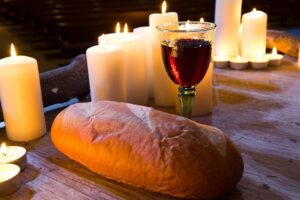
Communion, incidentally, is Jewish kadush (קדוש), reversed. Jews welcome in shabbat by first blessing the wine, then the bread. Christians celebrating communion do it the other way around, as instigated by Jesus at the Last Supper in Matthew’s Gospel:
‘Then he took a cup, and when he had given thanks, he gave it to them, saying, “Drink from it, all of you. This is my blood of the covenant, which is poured out for many for the forgiveness of sins.’
(Matthew 26:27-28)
Jesus was asking his assembled disciples and relatives to take his nefesh into their bodies! The Catholic Church calls this transubstantiation: they say that communion wine or grape juice is mystically transformed into Jesus’ actual blood as each communicant drinks. This is okay for Christians, but drinking blood is taboo for Jews.
SHOCKING!
The idea would surely have been abhorrent to them!
We find this to have been the case elsewhere. In John’s Gospel, Chapter 6, Jesus was teaching a great crowd of people by the Sea of Galilee. ‘The Jewish Passover Festival was near,’ (John 6:4).
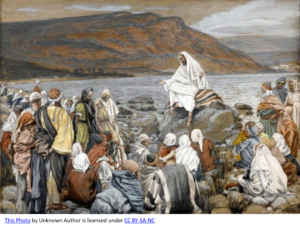
Passover (Pesach, פסך) is one of the three pilgrimage holidays, that Jews marked by going up to worship at the Jerusalem Temple. It remembers how the blood of one lamb, daubed on the doorposts of the households of Jewish slaves in Egypt, saved their firstborn children and livestock from the Tenth Plague: Death of the Firstborn.
John is underlining that the coming Passover would have been in his listeners’ thoughts as Jesus became what can only be termed outspokenly contentious.
He told the crowd: “Very truly I tell you, unless you eat the flesh of the Son of Man and drink his blood, you have no life in you. Whoever eats my flesh and drinks my blood has eternal life, and I will raise them up at the last day. For my flesh is real food and my blood is real drink. Whoever eats my flesh and drinks my blood remains in me, and I in them.”‘
(John 6:53-56)
Not surprisingly, many of Jesus’ (kosher) followers turned away from him that day. Not the Twelve, however.
LAST SUPPER
They would show themselves willing to absorb his nefesh into themselves at the Last Supper, (as would the early Jewish Christians who later would eat the Lord’s Supper, (Acts 2:46-47).)
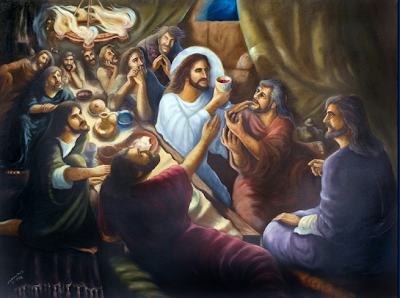
‘After (The Last) Supper (Jesus) took the cup, saying, “This cup is the new covenant in my blood; do this, whenever you drink it, in remembrance of me.”’
(1 Cor. 11:25)
This new covenant is thought to be from Jeremiah:
‘“The days are coming,” declares the Lord, when I will make a new covenant with the people of Israel and with the people of Judah. It will not be like the covenant I made with their ancestors when I took them by the hand to lead them out of Egypt, because they broke my covenant, though I was a husband to them,” declares the Lord. “This is the covenant I will make with the people of Israel after that time,” declares the Lord. “I will put my law in their minds and write it on their hearts. I will be their God, and they will be my people.”’
(Jeremiah 31:31-33)
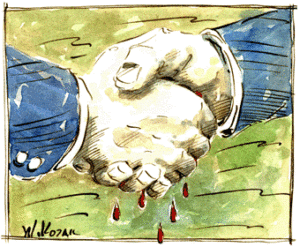
Rather than ‘making’, Jews of the Bible would ‘cut’ a covenant. The term arose because a covenant was sealed in their blood. So, they had to cut themselves. A still current example of this would be circumcision, when a baby boy’s foreskin is removed. His blood is spilled to symbolize his acceptance of God’s covenant. When two human parties cut a covenant, both would spill a little blood.
Jesus upheld his side of the covenant through his blood, spilt for us. He went to the cross and took the punishment we deserved. At the last supper, he told us that our side of the bargain was to consume the wine that stood for his blood and remember—remember him, what he did and what he stood for.

Don’t forget to sign up in the sidebar to receive notifications of my new posts about my life in Israel! You will also receive my 5-minute testimony about HOW I MET JESUS. It happened unexpectedly and supernaturally – right here in Jerusalem.
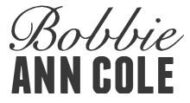
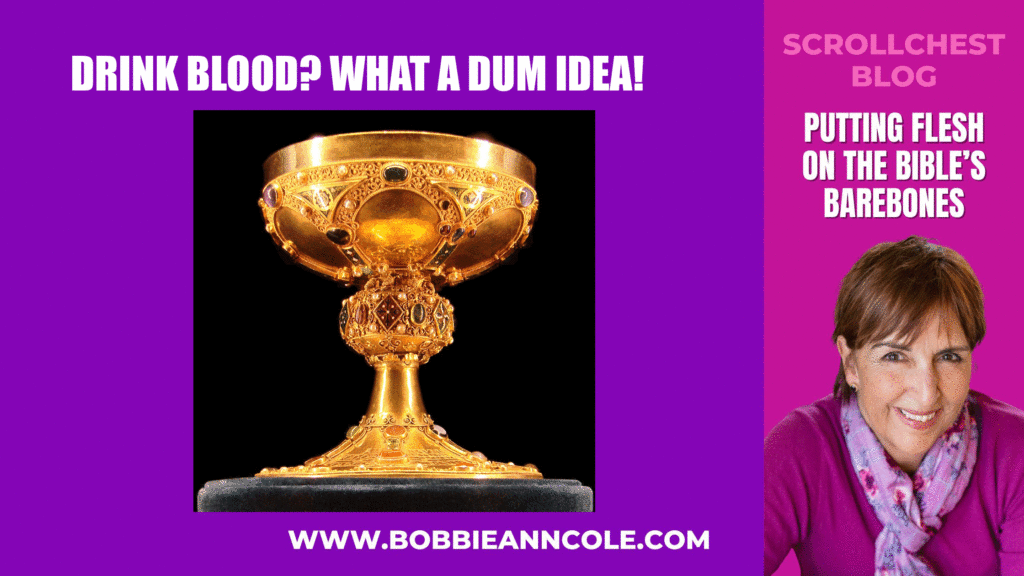
I am enjoying your messages and your bravery, and a little envious of you being in Jerusalem
Thank you, Brenda. We feel safe – unlike Tel Aviv where we first arrived on Oct 9th (2 days after the massacre), we are not in and out of the shelter here. However, the cruel gunning down of folk at a bus stop by Hamas on Thursday the other day was unnerving.
Hi Bobbie
I too am envious of you being in Jerusalem even at the present time with all that is going on over there. As far as drinking the actual blood at communion I have always taken wine or non-alcoholic wine in some churches, even Ribena at times but never blood. I do not think I could drink actual blood – the taste would put me off!! I have always understood the wine to stand as a symbol of the Lord’s blood, even though Scripture talks of Him mentioning His blood and His flesh. Surely, after 2,000 years we could not be expected to eat His literal flesh and drink His literal blood as both the bread and the wine are symbols.
Enjoy your studies and look forward to you sharing more as time goes by.
Esther
What struck me, Esther, was that Jews, who do all they can to clear their meat of blood, were instructed by Jesus to drink wine symbolizing his blood – i.e. absorb into themselves his nefesh. It is so powerful but a big ask of the early Jewish believers.
I love the symbolism of it all. At creation God breathed His ruach into the nefesh of our first parents, giving us life. Our life comes from Him. But when they fell, we needed His covering (animal skins not fig leaves), because blood had to be shed for our forgiveness – “without the shedding of blood there is no forgiveness”. Only the blood from the Perfect Sacrifice, Yeshua, is drinkable. Just musing here. Thank you, Bobbie!
Thank you, Laura, for expanding on what our nefesh adds up to.
Thanks Bobbie for your resilience spirit and willingness to share important views here.
It is amazing to hear the contradictory beliefs arising from the land where Jesus and his disciples laboured to teach. Before the blood actually poured, he gave them a cup of wine as a symbol of his blood that would pour for the forgiveness of sins (at the last supper).
I agree with your reasoning. My aim was to explore how all present, as Jews would have felt about this invitation. Thank you for your views, Eve.
Bobbie, I am enjoying your posts. Your teachings inspire me to dive deeper into The word.🙏
Good to see you here, Cheryl. I am loving what I am learning here at the Hebrew University in Jerusalem. So much food for thought.
Bobbie, a few years back I did an extensive study on what covenants were and how the parties entered into them in Bible times. A covenant at that time was ‘cut’ and lasted for life of the individuals. Love your writing and sharing with us what you are learning.
Thank you, Linda. It makes sense that once the blood is mingled, the bond should be lifelong, although it is not an aspect I’d considered until you mentioned it.
Love all you are sharing about what you are learning in your studies. We are privileged to receive your writings. Thank you. .
A few years ago I did an extensive study on Biblical covenants. It was such an eye opener of what Jesus meant when He talked about a new covenant. Also how there was usually blood spilled when a covenant was ‘cut’. Jesus’ spilled His blood to fulfill the total requirement of the new covenant. It is so important for us to understand the symbolism of communion and what Jesus was setting up when He instituted it at the last supper.
Absolutely. I agree, Linda. Thank you for this.
Lovely post, Bobbie! Thanks. In my family, we take the blood covenant very seriously. After night prayers before we go to bed, we plead the blood of Jesus Christ 7 times.
Also, on Fridays, we share communion.
The blood covenant is powerful. Thanks again for bringing afresh what our Lord offered us with His blood and what we are expected to do with it[drink]! It is interesting to learn that Jews bless the wine first before the bread. We will continue to pray that more Jews will see communin the way our Lord Jesus meant it to be.
One of the joys here, Sophia, is to attend messianic worship with Jews who are of faith. Here is one we got to meet at the Joshua Aaron Gather the Nations event on Thursday, which was also the first night of Chanukah: https://youtube.com/shorts/DQIwYiX8lqE?si=XhqAvCIHlE3jK_s4
Hi Bobbie,
I loved your post. It caused me to pause and a couple of times go to my study bible.
Then I remembered way back in my youth in the Anglican church we sang,
Bread of heaven on thee we feed, for thy flesh is meat indeed,
ever may our souls be fed with this true and living bread.
In my application study bible, referring to John 6: 56, it states: This was a shocking message–to eat flesh and drink blood. Jesus was not talking about literal blood…He was saying His life had to become their own. As Linda says, it is an act of symbolism when we take communion.
I am glad you loved this post, Mary, and that it caused you to go to your Bible. Yes, communion is a symbolic rather than a barbaric act, and Kiddush for Jews has always been about giving thanks for God’s abundance, rather than drinking blood.